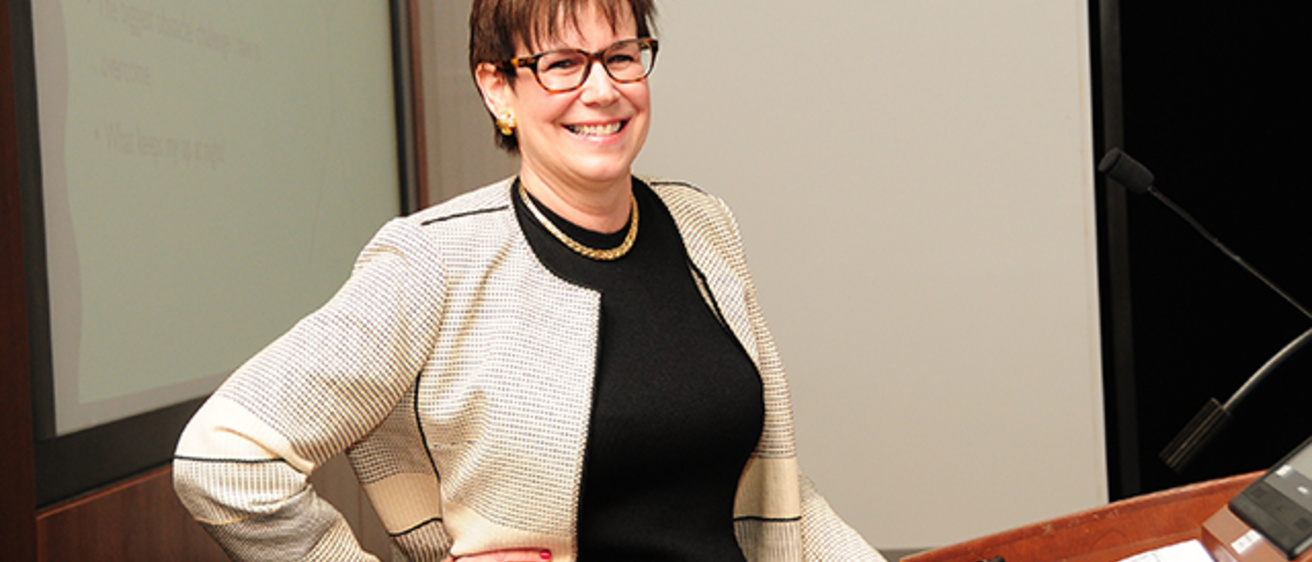One big conversation after another.
That’s how University of Iowa alumna Lori Pedelty describes a typical day as CEO of Pedelty Enterprises, a leading Chicagoland management consulting firm.
By 5 a.m., she’s rushing into meetings where corporate strategic planning and employee conflicts fill the room with conversation.
Though much of her work is like that of the rest of the corporate world, her approach is vastly different. Pedelty is a “CEO whisperer.”
In her 30-year career, Pedelty’s clients have used that term to describe the high-energy 58-year-old.
A 1980 graduate of the UI Tippie College of Business’ accounting program, Pedelty leads large-scale organizational changes for small to mid-sized companies. Among her clients are the Chicago Housing Authority, the Cook County Sheriff’s Office, and the renowned Chicago Zoological Society.
“I help CEOs move from their head to their heart,” Pedelty says. “As leaders, we’re not going to connect with people using our heads. We’re going to connect with people using our hearts, and to use our hearts means we need to be open and be vulnerable in a way that many CEOs have never been and felt they never could be.”
While at the UI, Pedelty’s path zigzagged a bit.
Dabbling in the UI’s theater program and then in music and dance, the Clear Lake, Iowa, native ultimately decided that if she were to become a teacher—a longtime goal—she needed to learn about organizations. The switch to the Tippie College of Business followed soon after.
After the 2017 Tippie Women Summit, where she led an interactive workshop about influencing positive change, Pedelty spoke with Iowa Now about the impact the UI has had on her professional career.
When you hear the phrase “Always a Hawkeye,” what comes to mind?
Good folk—just the best people on this Earth. Whether they’re from (the UI) or the state of Iowa, I just think how wonderful and grounded, good and kind and generous the people of Iowa are.
Describe a time during which you think your UI degree benefited you the most.
As a new accountant at Arthur Anderson & Co., I realized very quickly—almost on day one—that I was a strong communicator. I knew that I had always been a strong verbal communicator, but as I watched other people around me write, my opinion of myself being an OK, maybe not even a very good writer, began to fall by the wayside. At the University of Iowa, we were taught to think and to question and to analyze and to problem-solve. We weren’t given rote answers to questions. In my field of public accounting, many of the other big schools just taught to the CPA exam. We were able to think beyond a standardized test.
Why did you choose to attend the University of Iowa? Why do you continue to come back?
I liked that, as a large university, it offered me options. I knew that at age 18 I didn’t know exactly what I wanted to be. I thought the arts, and I thought teaching, and then the more I grew, the more I began to understand who I was. Iowa provided me with the breadth of a very vibrant artistic community and the arts and liberal arts, along with the hard-core, more quantitative world of finance, economy, and accounting. I liked having all of that at my fingertips.
What memory of the University of Iowa do you cherish the most?
I loved being a (Kappa Alpha) Theta. It gave me an opportunity—the field that I was studying was primarily populated with male students at that time—to hang with the girls. I was the only girl growing up—I have two brothers and a majority of boy cousins in Clear Lake (Iowa)—so living in a sorority house full of women was a new experience and one I will always cherish.
Why are things like the Tippie Women Summit and women-owned businesses important today?
Today’s CEOs need to be able to lead in a world of chaos. Businesses today are under extreme pressure to be flexible, creative, and innovative, and teams need to work collaboratively across the enterprise to meet ever-changing market demands. These are attributes that are often associated with women. Businesses need bold leaders who know how to bring people together, whether that means five or 5,000 or 55,000 or more, and have them work with focus, speed, and commitment toward a shared vision. Women have been developing the highly valued skills to do this for generations.
How do you feel when you come back to Iowa City? Is it like coming home?
When I was driving across the Mississippi River, my GPS said “Welcome to Iowa” and I teared up.
